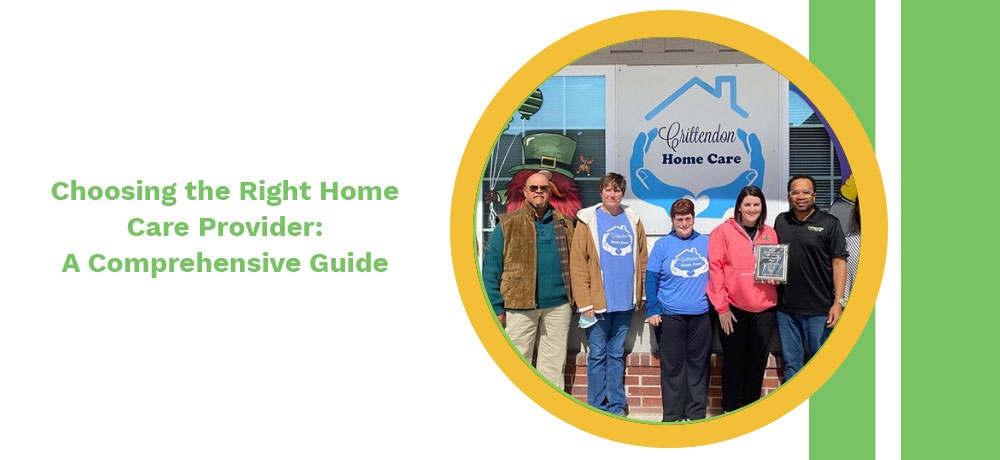Choosing the Right Home Care Provider: A Comprehensive Guide

In the realm of home care services, the decision to choose the right provider is paramount to ensure your loved ones receive the best care possible. Whether you're seeking assistance for an aging family member, a disabled relative, or someone in need of specialized medical attention, making an informed choice is crucial. This blog will walk you through the key considerations when selecting a home care provider, with a focus on generic information that applies to all situations.
Understanding Home Care Services
What is Home Care?
Home care refers to a range of services provided in the comfort of a person's own home. These services are designed to assist individuals with daily activities, medical needs, and emotional support, enabling them to maintain their independence and quality of life. There are different types of home care services.
1. Personal Care Services
Caregivers offer a range of vital services, including personal hygiene assistance such as bathing and grooming, aiding with mobility and transfers, and providing medication reminders. These essential tasks ensure individuals receive the necessary support to maintain their health and independence, promoting a higher quality of life and well-being.
2. Companion Care Services
In addition to essential healthcare services, caregivers also provide invaluable companionship and emotional support to enhance the well-being of their clients. They often assist with meal planning and preparation, ensuring proper nutrition, and contributing to a clean and organized environment through light housekeeping duties. These aspects of caregiving extend beyond medical care, fostering a holistic and compassionate approach to meeting individuals' needs.
3. Skilled Medical Care Services
Nursing care, wound management, and medication administration are fundamental aspects of patient well-being, supported by dedicated healthcare professionals. Complementing these essential services are physical therapy, occupational therapy, and speech therapy, each tailored to specific patient needs. Managing chronic conditions is also integral, involving ongoing monitoring, medication adjustments, and lifestyle guidance, all aimed at improving long-term health outcomes. Together, these components create a comprehensive and patient-centered approach to healthcare, ensuring holistic care and optimal recovery.
Assessing Your Needs
Identifying Your Loved One's Needs
Before choosing a home care provider, it's essential to assess your loved one's specific requirements. Consider factors such as their medical condition, daily routines, and emotional needs. This evaluation will help you determine the level and type of care required.
Care Plans Tailored to You
A reputable home care provider will work with you to create a personalized care plan. This plan outlines the services needed, the frequency of visits, and any special instructions. It should be flexible and adjustable as your loved one's needs change over time.
Budget Considerations
Understanding your budget is crucial when selecting a provider. Determine whether you're eligible for financial assistance through programs like Medicaid, Long-term Care Insurance, or Veterans Affairs (VA) benefits. Private pay is also an option, but it's essential to discuss costs upfront to avoid unexpected expenses.
Researching Home Care Providers
1. Home Care Agency Accreditation
Ensure the agency is accredited and licensed by the appropriate state and local authorities. Accreditation demonstrates a commitment to meeting specific quality standards.
2. Staff Qualifications
Verify that the caregivers are certified, licensed, and trained to provide the required services. Registered Nurse care staff should oversee the care provided.
Reputation and Reviews
1. Online Reviews
Look for reviews and testimonials from previous clients. Online platforms and social media are valuable sources of feedback.
2. Word-of-Mouth Recommendations
Seek recommendations from friends, family, and healthcare professionals who have experience with home care providers.
Evaluating Quality of Care
Regular Care Plan Reviews
The home care provider should conduct regular assessments and reviews of your loved one's care plan to ensure it meets their evolving needs.
Supervision and Accountability
Inquire about how the agency supervises its caregivers. There should be mechanisms in place to monitor the quality of care provided.
Emergency Protocols
Ask about the provider's emergency protocols and how they handle unforeseen situations, ensuring your loved one's safety is a top priority.
Availability
Confirm that the agency offers 24/7 support and assistance in case of emergencies.
Choosing the right home care provider can be a daunting task, but by following these guidelines, you can make an informed decision that promotes the well-being and happiness of your loved one. Remember that each situation is unique, and finding the perfect fit may take time and effort. Your loved one's comfort, safety, and quality of life are worth every consideration in this important decision-making process.
If you are looking for a home care provider, then contact Crittendon Home Care. Our dedicated team is here to provide the care directed by our Registered Nurse care staff.
Get in touch with us today
To learn more about what we do, please click here. To contact us, please click here or call us at (913) 303-2400.